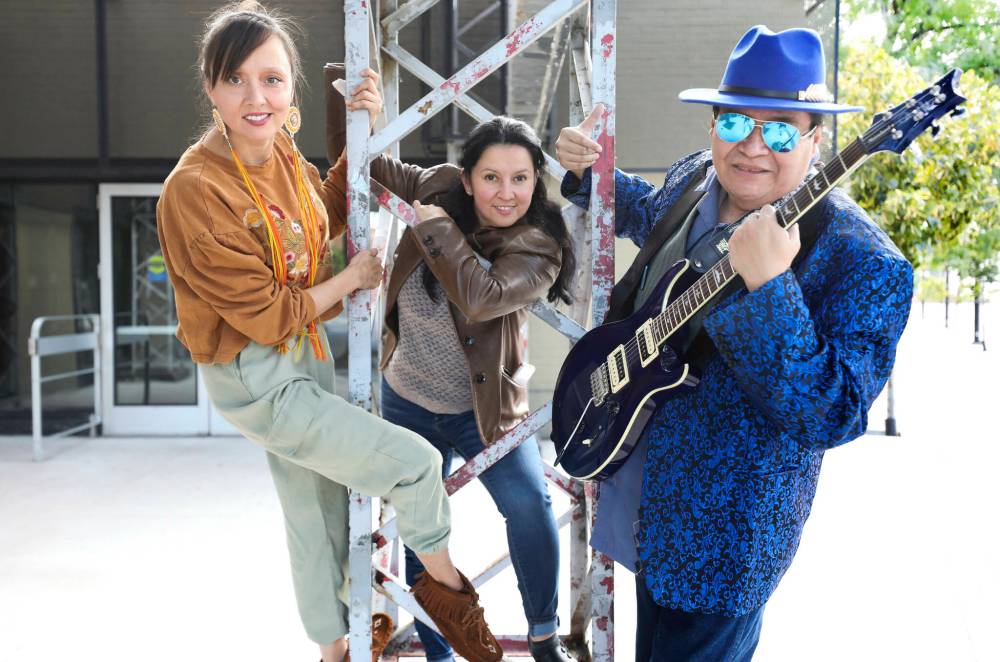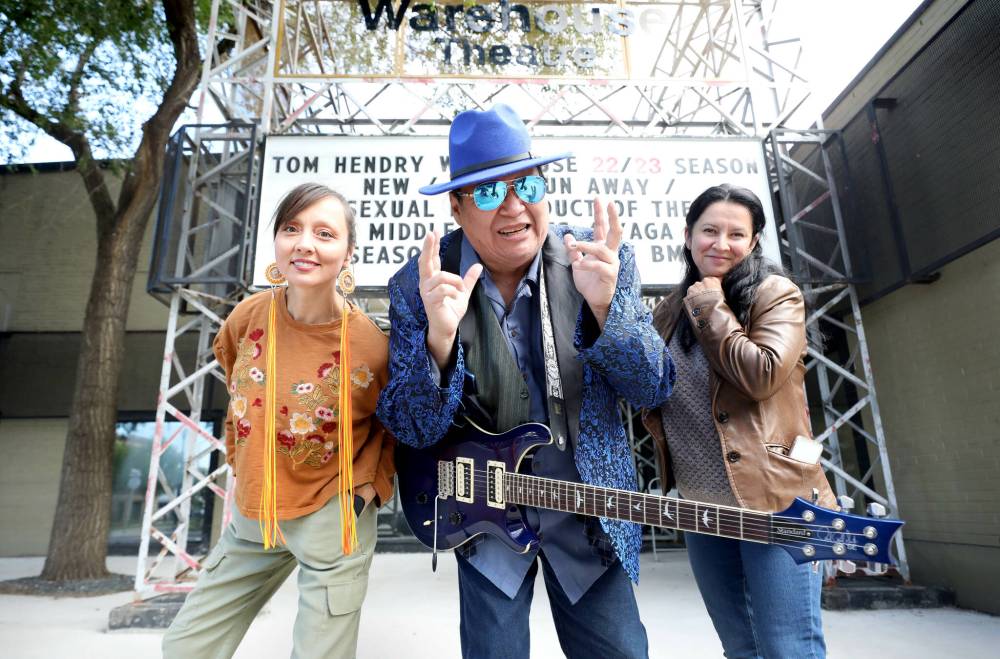From budding to blooming Novice Indigenous playwrights shape stories for stage as part of Pimootayowin Creators Circle
Read this article for free:
or
Already have an account? Log in here »
To continue reading, please subscribe:
Monthly Digital Subscription
$0 for the first 4 weeks*
- Enjoy unlimited reading on winnipegfreepress.com
- Read the E-Edition, our digital replica newspaper
- Access News Break, our award-winning app
- Play interactive puzzles
*No charge for 4 weeks then price increases to the regular rate of $19.00 plus GST every four weeks. Offer available to new and qualified returning subscribers only. Cancel any time.
Monthly Digital Subscription
$4.75/week*
- Enjoy unlimited reading on winnipegfreepress.com
- Read the E-Edition, our digital replica newspaper
- Access News Break, our award-winning app
- Play interactive puzzles
*Billed as $19 plus GST every four weeks. Cancel any time.
To continue reading, please subscribe:
Add Free Press access to your Brandon Sun subscription for only an additional
$1 for the first 4 weeks*
*Your next subscription payment will increase by $1.00 and you will be charged $16.99 plus GST for four weeks. After four weeks, your payment will increase to $23.99 plus GST every four weeks.
Read unlimited articles for free today:
or
Already have an account? Log in here »
Hey there, time traveller!
This article was published 26/09/2022 (1168 days ago), so information in it may no longer be current.
Pimootayowin is an Anishinaabemowin word meaning “journey.”
THEATRE PREVIEW
Pimootayowin: A Festival of New Work
● Tuesday to Saturday, Tom Hendry Warehouse
● Admission is free
● Doors open 45 minutes before the readings. Seating is first-come, first-served with a maximum capacity of 50 people.
Tuesday, 7 p.m.
Maybe This Afternoon by Rhonda Apetagon, directed by Katie German
Wednesday, 7 p.m.
The Rapturous Promises of Love and Death by Trevor Greyeyes, directed by Ian Ross
Waawaakeshi by Nova Courchene, directed by Charlene Van Beukenhout
Thursday, 7 p.m.
Non-Machinable by Cynthia Wolfe-Nolin, directed by Katie German
Saturday, 4 p.m. and 7 p.m.
Cory and Daisy by Bridget Courchene, directed by Simon Miron (4 p.m.)
Blood Sisters by Elizabeth Denny, directed by Audrey Dwyer (7 p.m.)
It’s also the apt name, chosen by acclaimed playwright Ian Ross (fareWel, The Third Colour), for the Pimootayowin Creators Circle, an initiative supported by the Royal Manitoba Theatre Centre that champions the creation of new works of theatre by Indigenous artists who are new to playwriting.
Under the leadership of Ross and assistant program director Katie German, six budding playwrights — Rhonda Apetagon, Bridget Courchene, Nova Courchene, Elizabeth Denny, Trevor Greyeyes and Cynthia Wolfe-Nolin — met every Wednesday from October to May to workshop ideas, tell stories, and go on journeys that are collective and individual, creative and personal.
This week, their works will be presented as part of Pimootayowin: A Festival of New Work, a play-reading series that will, for the first time in the Circle’s two-year history, be held in person at the Tom Hendry Warehouse Theatre.
“The fact that we get to look at people’s faces, taking in these stories, I think that’s going to be really beneficial to all the creators, to just see how (audiences) respond and what they pick up from it,” says German, who will be directing some of this week’s readings.
German herself has enjoyed having a front-row seat to the creation and development of these works over the past several months.
“It’s just exciting to see the birth of those ideas, and how Ian fans the flames of those ideas and makes them turn into these wildfires that just take off,” German says. “It’s really thrilling.”
For Wolfe-Nolin, a Métis writer, filmmaker, performer and educator, being involved in the Creators Circle gave her her the confidence to complete some of the projects that had been rattling around in her brain.
Wolfe-Nolin recalls studying canonical texts in university, which ended up influencing her own writing. “It humbled all that rawness and energy and put it in MLA (Modern Language Association) format and the English tongue,” she says.
Her Pimootayowin journey, then, has been one of self-rediscovery.
RUTH BONNEVILLE / WINNIPEG FREE PRESS Cynthia Wolfe-Nolin (from left), Rhonda Apetagon and Trevor Greyeyes are a few of the playwrights presenting Pimootayowin: A Festival of New Work.
“I’m finding my way back to who I am and my voice — my real voice,” she says. “Not Shakespeare’s voice, not Caryl Churchill’s voice, not emulating Yasunari Kawabata, not choking on Jane Austen all my life.”
Wolfe-Nolin’s play, Non-Machinable, focuses on working-class women from diverse backgrounds working in a postal service unit — including a Métis woman named Postie, who breaks protocol when she opens and reads a return-to-sender letter from an Indigenous woman in prison.
No spoilers here, but the letter also stirs a lot up in Postie, too.
“I’ve always been haunted by the idea of a letter going unread,” Wolfe-Nolin says.
Greyeyes, an established Anishinaabe writer, journalist and musician, is no stranger to storytelling. “But I don’t think I’ve written a play since high school,” he says.
“I take things that have happened to me in real life and I beat them up and I stretch them out, kind of change them in some way but the essence of it is still there.”
His Pimootayowin journey reconnected him with his alter-ego, Urban Greylips, a character he’s used in previous stories.
“I take things that have happened to me in real life and I beat them up and I stretch them out, kind of change them in some way but the essence of it is still there.”
Greyeyes realized it had been a good 20 years since he last visited Urban Greylips.
“Like myself, he’s aged, you know? He’s not the young, rascally writer he was in his 20s or 30s.”
Here’s where fiction deviates from reality: Greyeyes has never married or had kids, but those things happen to Greylips, who becomes a first-time dad later in life and realizes that by the time his kid reaches his teen years, he’ll be turning 70.
The resulting The Rapturous Promises of Love and Death is a fourth-wall-breaking record of what their old man was like — “maybe not in his prime, maybe past his best-before date” — that also incorporates music.
RUTH BONNEVILLE / WINNIPEG FREE PRESS Cynthia Wolfe-Nolin (from left), Trevor Greyeyes and Rhonda Apetagon.
In 2020, Greyeyes was a writer-in-residence at the Manitoba Museum, working on a project that delves into his family’s history and their resistance to the illegal surrender of the St. Peters Reserve — a precursor to Peguis First Nation — in 1907. He found interviews with his relatives in newspapers from around the turn of the century, and took note of the language and framing of the stories — such as one that made reference to an “occupation” of marshland by “insurgent Indians,” even though that land was theirs.
“But this is always told through the lens of the colonizer, and not of the people themselves,” Greyeyes says. “Because I’m certain they wouldn’t have called themselves ‘insurgents.’ So, I think it’s important for us to take control of it and to tell our own stories.”
Having Indigenous playwrights tell Indigenous stories is what makes initiatives such as Pimootayowin so important, German says.
“When I go to theatre, and I know when other people go to theatre, we’re always looking for ourselves on that stage,” German says. “And as a young Indigenous person watching theatre, I didn’t see me onstage a lot. So, the fact that there is going to be six Indigenous stories this year, with a whole bunch of Indigenous people onstage, written by Indigenous people — it’s just exciting to think that someone’s going to sit there and be like, ‘That’s me. I can do this.’”
jen.zoratti@winnipegfreepress.com
Twitter: @JenZoratti

Jen Zoratti is a Winnipeg Free Press columnist and author of the newsletter, NEXT, a weekly look towards a post-pandemic future.
Our newsroom depends on a growing audience of readers to power our journalism. If you are not a paid reader, please consider becoming a subscriber.
Our newsroom depends on its audience of readers to power our journalism. Thank you for your support.






